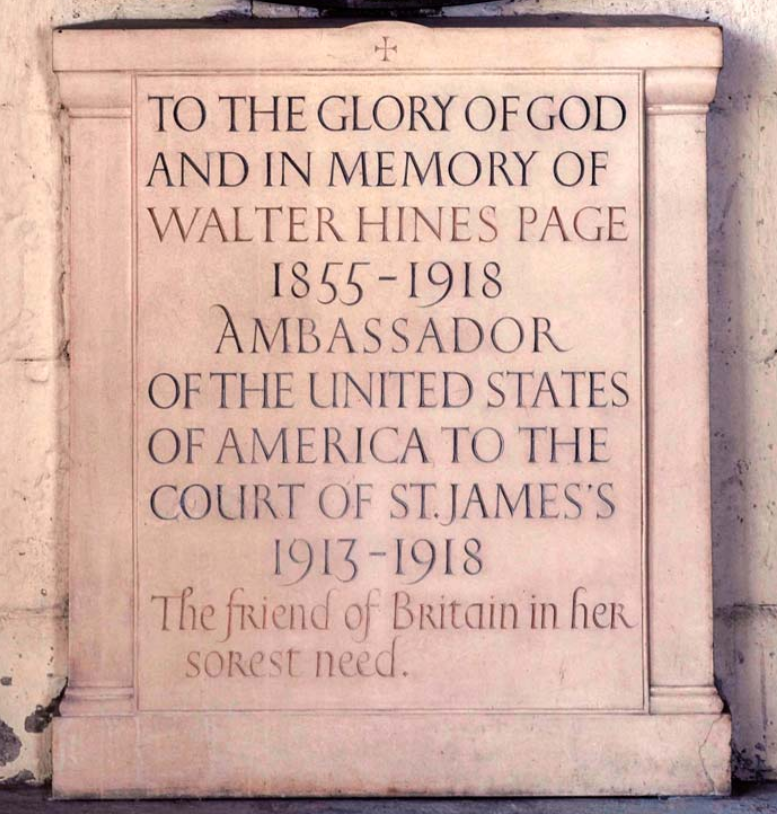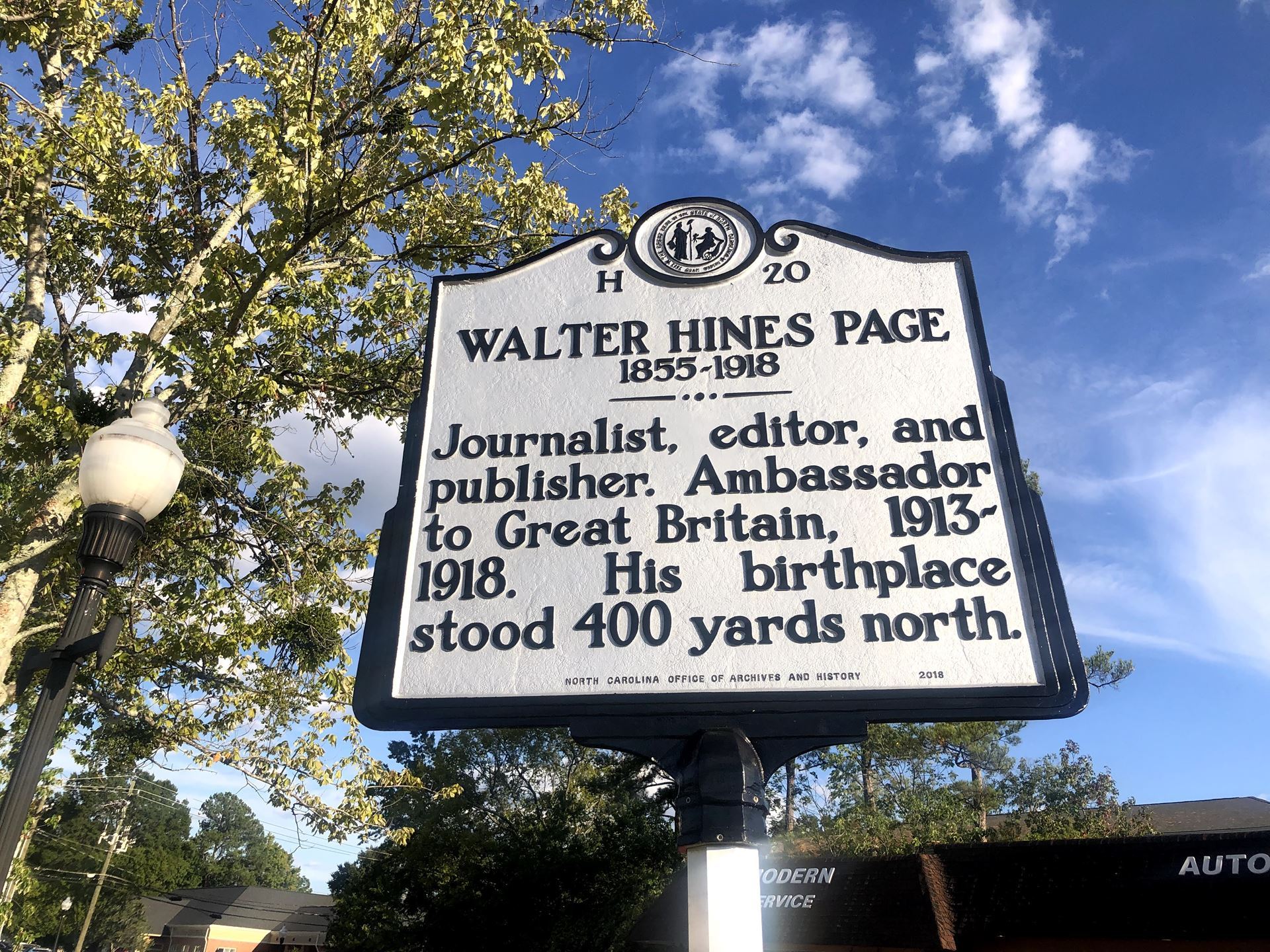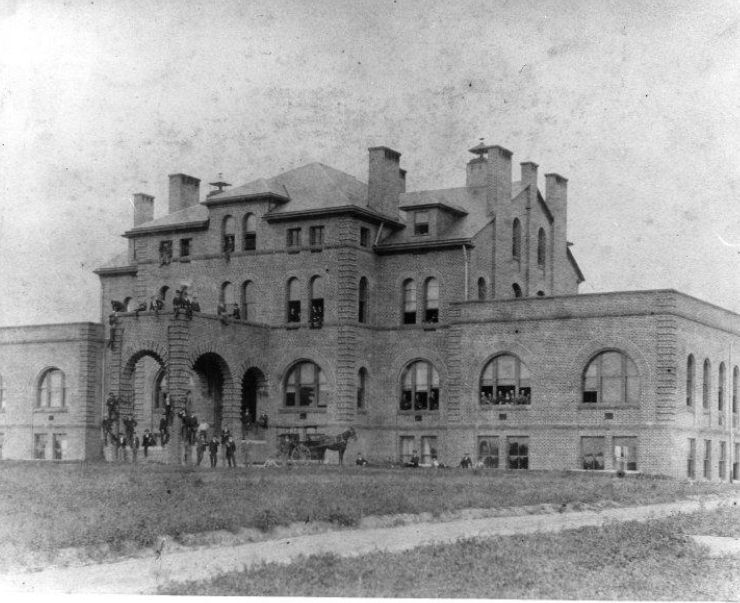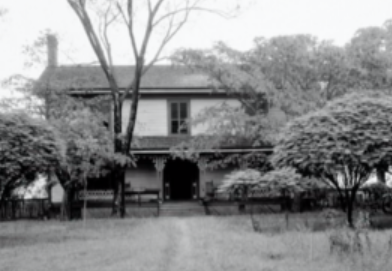By Pat Sweeney
WHP – Walter Hines Page – or “WAT” a nickname favored by the Page family for their first Cary-born son, therefore Cary’s true “First Son” is, historically, Cary’s most widely known man of political consequence. WHP capped his public life by serving as the Ambassador to the Court of Saint James during WWI, as part of the Woodrow Wilson administration.
Readers interested in revisiting or learning about the role WHP played in this war can do so through Pulitzer-prize winning autobiographies by Cooper and Hendrick, old newsprint and commentaries aplenty on the web or in libraries with extensive historical materials. The Olivia Raney Library located nearby in southeast Raleigh is such a library.

The Wake County's Cary Regional Library chose to salute WHP as a son of Cary because of his career in journalism and publishing. Books, book, books were always a keen part of WHP’s life. He learned to read at his mother’s knee as a home-schooled, if you will, boy. In those days, home-schooling was basically the way of early education. Lucky the child whose mother was herself a reader and devourer of the written word. It is said that Katherine Page always carried a book in her apron or dress pocket to enjoy during brief respites in an otherwise hectic day! As a single/only child for four years, WHP was the epicenter of his mother’s world. Walks thru the woods, learning and observing the world of Mother Nature and quite times lingering over books like The New England Primer, a book of verse introducing children to the alphabet using Bible lessons, awakened a sincere fondness and joy in the written word…

Most Caryites of recent emigration first learn of WHP from the highway history marker along Chatham Street near the Page-Walker Arts & History Center, part of the original homestead of Cary’s founder, Frank Page, as well as birthplace for WHP. Father and son both would choose independent career paths from their forebearers. The plow and the hoe would be exchanged for more modern, contemporary career paths. Frank seeing the future economy of industry and business became a woodsman and lumberjack, and WHP would venture off into the world of words, ideas and international diplomacy. Both father and son understood the power of personal relationships and partnerships as they practiced the power of persuasion for change and development in their chosen areas of interests.
WHP, in his early scholastic years, met and was mentored by social activists who saw the need for ‘the rebuilding of the commonwealth’ following the Civil War upheaval of social and cultural norms, especially in the South, and most especially in his beloved North Carolina. Joining other social visionaries of the time, WHP helped sow the seeds of social and cultural reform and development that would become the basis for Cary’s present-day position in the economic and social dynamism that is the Research Triangle…A prime example of this WHP local activism is seen in his contributions to the founding of NC State University. As member of a group of seven self-appointed ‘public-spirited’ young men (so described by author Hendrick) WHP aided and abetted the establishment of The “State College for Agriculture and Engineering,” later to become NC State University.

Because the Page family left Cary after only 26 years of residency, and WHP earlier becoming a part-time resident while attending the Bingham School in Mebane, NC, Trinity College in Durham, NC, Randolph-Macon in Ashland, VA, and lastly concluding his formal studies at the newly founded Johns Hopkins College in Baltimore, MD, the early years of WHP’s career and social activism have not been highlighted in the Cary memory and reflections of him. The hope is that the newly dedicated room to him in our library will spark a collective interest and discovery of our local boy’s hiding-in-plain-sight historic presence among us…After all, aren’t we all the product of our childhood family ties and cultural landscape?
Wat, as I shall now reference him, hoping you feel more familiar with him after this brief introduction, loved Cary and its environs wholeheartedly. In fact, I would say his love for this place and his family were of equal proportions…In his own writings throughout his life, he speaks of returning to Cary for rest and re-focus, describing Cary and North Carolina as his place of personal refuge, his place of sustenance in times of emotional fatigue, his underpinning as well as fount of his work on behalf of ‘rebuilding the commonwealth.’

Experiencing the worst of the Civil War at a safe distant in Cary, Wat, nonetheless was shaped by the war’s presence, especially as Sherman and the Yanks spent approximately three weeks in the area bringing the war to a virtual close. These days allowed Wat to meet and interact with the “enemy” in a ‘face-to-face’ manner; to be challenged in his mindset about the war, its’ causes and effects on not only his family and State, but society and the country as a whole…
I have penned a slim volume, available in the library, about Wat and his Civil War childhood here in Cary. The story is my imagined days and nights (based on WHP bibliographies by Cooper and Hendrick) of Wat as the First Son during Cary’s founding years and the intersection of his coming-of-age years and the issues of racial relations during the Civil War. Especially interesting to me are the crosswinds of the Civil War and their impact on this young boy’s evolution as advocate for public education, journalism and publishing – all born and bred from his Civil War roots. It is an easy read; check it out!!! (Wat, A Son of the Civil War, by Sweeney)
By way of introduction to WHP’s deeply held love for these parts, please enjoy the following lines from his poem “The Song of the Pines,” disclosing his love for the Old North State, especially the State’s long-leaf pines.
They hang their harps for the winds to sweep-
Strung to a soft low Southern tone;
An ocean of music from mountain to deep
Waves with the waves of the wind – lone
And how is their song,
Centuries long,
The song of the lands that beneath them sleep.
. . . . … . . . . . . . . . . . . . . . . . . . . . . . . . .
The fair in their sound are laid to sleep,
The bones of the brave beneath them rest;
The hopes of the dead die not, but keep
In their song a thrill for a younger breast.
‘Tis the tale of her years,
That the old State hears
Roaring in music from mountain to deep.
Majestic, eternal, the swell of their roar-
A burden of hope, if a burden of woe-
Telling In song, traditional lore;
Ernest and tender, solemn and slow,
A promise and prayer,
Forever they hear,
From the past to the future for evermore.
There are many more local stories to be shared about WHP, aka Wat. Watch this space…
